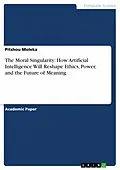Academic Paper from the year 2025 in the subject Computer Sciences - Artificial Intelligence, grade: 19, , language: English, abstract: The Moral Singularity: How Artificial Intelligence Will Reshape Ethics, Power, and the Future of Meaning offers a pioneering synthesis of transdisciplinary insights into the moral implications of artificial intelligence (AI) on human societies, governance, and philosophical inquiry. In an era marked by the rise of autonomous, complex AI systems, traditional moral frameworks founded on human-centric assumptions are no longer sufficient to address the ethical dilemmas posed by these new technologies. This book challenges conventional paradigms and introduces the concept of the Moral Singularity, a moment in which AI will radically transform human ethics and moral responsibility, much as the technological singularity is said to alter intelligence itself. Drawing on a diverse range of philosophical, religious, and ethical traditions-including Ubuntu, Islamic jurisprudence, and Christian ethics-the book proposes new models for understanding moral agency, responsibility, and justice in a world shared with intelligent machines. The book explores how African relational ethics (Ubuntu), Islamic concepts of justice (Adl) and moral accountability, and Christian principles of stewardship and the Imago Dei can collectively inform AI ethics in a global context, offering a more holistic and inclusive approach to the ethical governance of emerging technologies. Central to the work is the development of two groundbreaking theoretical frameworks: Distributed Responsibility Theory (DRT), which reconceptualizes moral accountability in decentralized and autonomous systems, and Ecological Moral Sovereignty (EMS), which emphasizes the interdependent relationship between human society, AI systems, and the ecosystem. The Moral Singularity provides a visionary analysis of the role of AI in shaping not only the future of technology but also the future of humanity's moral landscape, proposing a new ethics capable of navigating the complexities of AI in an interconnected world.
Autorentext
Pitshou Moleka est chercheur postdoctoral à Eudoxia Research Centre (Inde) dans les domaines d'innovationologie, une nouvelle science dont il est le créateur, et dans le domaine du leadership. Il a suivi les formations de développement professionnel à Calvin University, et est détenteur d'un diplôme de doctorat (PhD) en leadership des organisations (Northwestern Christian University). Il est invité dans plusieurs universités pour des cours et des conférences : BBTI Global College of Leadership (Botswana), Howard University (International conference on stigma), University of Capetown (Conférence sur les innovations en sciences sociales et humaines), Australian University of Kuwait sur la digitalisation... Il est auteur de plus de 20 livres et chapitres de livres dont certains sont publiés dans les plus prestigieuses maisons d'édition du monde comme Oxford University Press, Taylor & Francis, ainsi que Palgrave. Il est marié à madame Julienne Mujinga Mpoy et est père de deux enfants.
